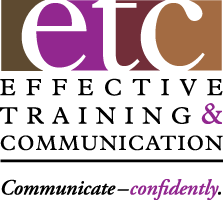Once you’re comfortable speaking up with more volume and vocal energy, it’s time to slow you down. An important component of your vocal delivery, your pace or rate of speaking can also impact your audience’s attention, interest and opinion of you. So can your ability to pause effectively.
Slow Down
Just as audience members tend to perceive a soft-spoken speaker as lacking in confidence or credibility, they react similarly to a fast-talking speaker. It doesn’t matter if this perception is accurate or not because their perception is your reality. You are what they think you are.
Each of us has a normal range of speaking rate, influenced by varying physical, psychological and cultural factors. And for some people, that comfort zone is too fast for the typical audience. It makes listeners work too hard to keep up with them. Since they don’t like to work hard, they often tune out and turn off. They also can perceive fast-talkers as insincere, nervous or too lazy to limit their content to the allotted time.
Embrace Silence
Many speakers have an unconscious and unrealistic fear of … silence. They think pausing shows weakness or lack of focus. On the contrary, speakers on the All Star harness the ‘Power of the Pause’ for maximum effect. They pause longer and more often at logical ‘’punctuation marks’ in their message – the end of a phrase, sentence or paragraph. Pausing more naturally decreases their overall rate of speaking, allows for controlled and comfortable breathing and facilitates glancing at notes or slides … in silence.
When coaching my executive clients, I often tell them to pause twice as long as they normally would in practice exercises. This doesn’t mean sounding choppy and unnatural, just speaking at a more conversational and relaxed rate. It takes some practice, but it’s worth the effort.
Good For Your Audiences
Decreasing your pace really benefits your audience:
- You’re easier to follow and understand. You allow them think-time to digest your message in small bites. The easier it is to understand your message, the easier it is for them to react to it the way you intended.
- You can also use pauses to highlight key words or points by pausing in front of them and/or after them. That emphasis makes it easier for the audience to connect to what you think is important.
Good For You
- Since audiences tend to equate fast pace with lack of credibility and confidence, slowing down helps project the proper image on them. It doesn’t matter if you are credible or confident, only that you look and sound that way. A more listener-friendly pace can help you fake that … convincingly.
- Slowing down also makes it easier for you to breath longer and deeper. By taking in more oxygen, you also minimize some Presentation Anxiety symptoms. So, your audience sees and hears a more confident and credible speaker – they like that.
So, when you’re practicing your presentations out loud, consciously decrease your pace and pause more effectively. Audiotape yourself so you can hear how much better you sound. Your audiences will definitely hear it!
